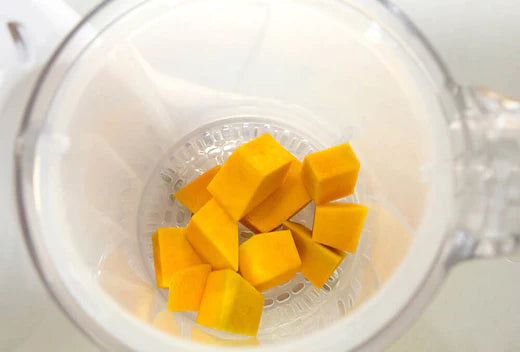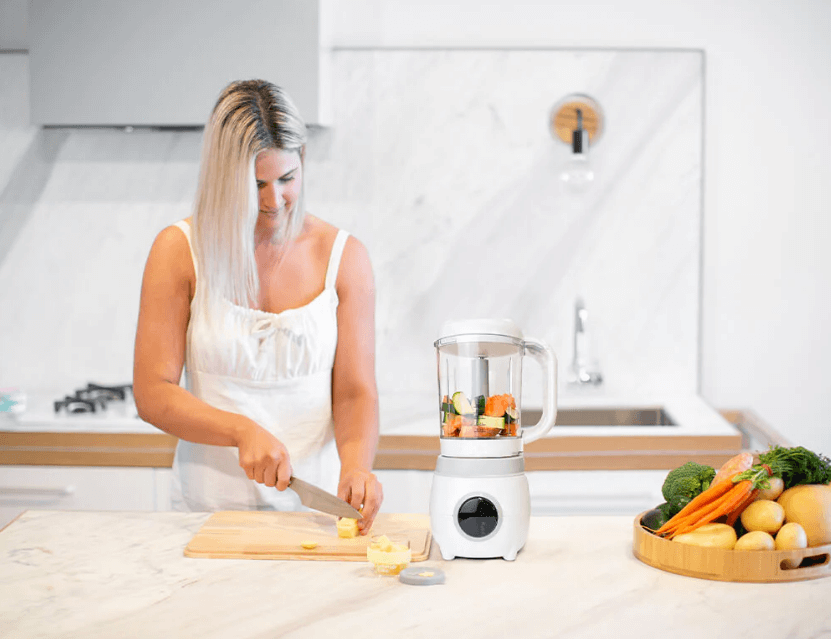Is a Baby Food Maker & Processor Essential for New Parents?

As your little one approaches the exciting milestone of transitioning to solid foods, you may find yourself pondering a common question: "Do I need a baby food maker and processor?" This decision can feel overwhelming, especially with varying opinions from fellow parents. Let's explore the pros and cons to help you determine if a baby food maker and processor aligns with your needs and preferences.
Pros of Using a Baby Food Maker and Processor:
Saves You Money
Crafting your own baby food proves to be more economical than purchasing pre-packaged options. By utilizing seasonal fruits and vegetables, you not only save money but also have the freedom to experiment with diverse flavors.
Provides Control Over Ingredients
By preparing homemade baby food, you gain insight into every ingredient that goes into your baby's meals. This empowers you to regulate sugar, salt, and preservatives, promoting a healthier diet from the start.
Facilitates Family Integration
Introducing your little one to the family's meals fosters a sense of unity and encourages healthy eating habits. With a baby food maker and processor, you can effortlessly blend portions of the family's meal into suitable textures for your baby.
Saves Time
Designed with busy parents in mind, baby food makers streamline the cooking process. Simply prep your ingredients, set the timer, and multitask while your baby's food steams and blends.
Eco-Friendly Option
Reduce waste by utilizing reusable food pouches or storage containers instead of disposable jars or pouches. This environmentally conscious choice aligns with sustainable living practices.
Versatile Use
Beyond purees, baby food makers accommodate various textures as your baby grows. From steaming vegetables for soups to blending ingredients for family meals, this appliance proves to be multifunctional.
Cons of Using a Baby Food Maker and Processor:
Time-Consuming Prep Work
While cooking itself is quick, the preparation phase—such as peeling and chopping—can be time-consuming. Not everyone has the luxury of spare time for extensive food preparation.
Additional Kitchen Gadget
If you already own a blender or steamer, you may question the necessity of adding another appliance to your kitchen arsenal. Consider whether the benefits outweigh the need for extra space.
Storage Challenges
Homemade baby food requires refrigeration or freezing, occupying valuable storage space. Be prepared to allocate room for storing larger quantities of homemade food.
Do I Really Need a Baby Food Maker and Processor?
Ultimately, the decision rests with you. Many parents successfully utilize existing kitchen tools, such as blenders or food processors, to create homemade baby food. However, if convenience and time-saving are paramount, a dedicated baby food maker and processor may become a valuable asset in your kitchen.
Considerations When Choosing a Baby Food Maker and Processor
Ease of Cleaning
Opt for machines with dishwasher-safe parts and easy-to-clean surfaces to streamline post-cooking cleanup.
BPA-Free Materials
Prioritize appliances made from BPA-free materials to safeguard your baby's health and well-being.
Timer Functionality
A built-in timer simplifies meal preparation, allowing you to attend to other tasks while your baby's food cooks.
Variable Blending Settings
Look for machines with adjustable blending settings to cater to your baby's evolving texture preferences.
In Conclusion
A baby food maker and processor offer a convenient solution for preparing wholesome meals for your little one. Embrace the opportunity to provide your baby with nutritious, homemade food, potentially eliminating the need for store-bought alternatives.
Remember, every family's journey into solid foods is unique. Whether you opt for a baby food maker or choose to explore alternative methods, approach this stage with confidence and joy.
Reference: The Top 9 Baby Food Makers: An Australian Guide 2022





